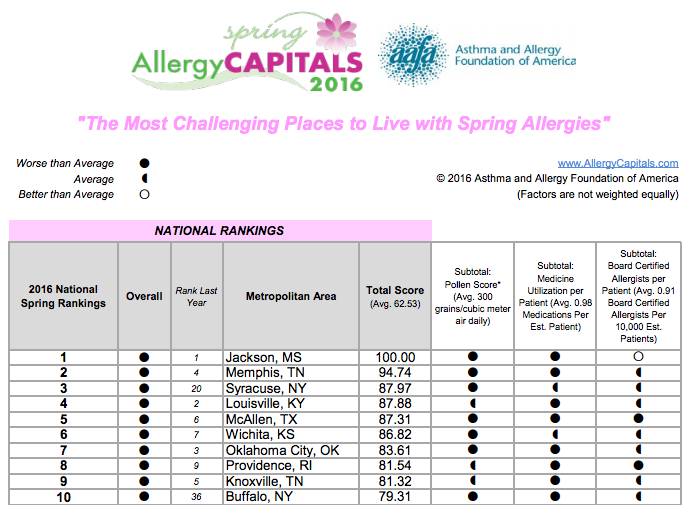By Veronica Combs
On this list, Louisville is headed in the right direction, if only slowly. In 2014, Louisville was #1 for spring allergies. In 2015, the Allergy and Asthma Foundation of America crunched the numbers and ranked us #2. This year, thanks to less pollen in the air (hard to believe, but true), Louisville has dropped to #4.
According to an AAFA spokesperson, it appears Louisville “lost” a number of certified allergists over the last year. The number of board certified allergists affects a city’s ranking in the Capitals list. This change was probably due to retirement, but there has also been significant consolidation among hospitals and physician offices. This trend may have contributed to the change in the number of providers available. Also, the city experienced lower than anticipated pollen counts.
The factor that kept Louisville high in the chart was the continued high level of pharmaceutical, over-the-counter and behind-the-counter allergy medication use. The lower than anticipated pollen levels didn’t seem to make much of a difference in terms of treatment needs.
Jackson, MS is at the top of the list for the second year in a row due to higher than average pollen scores, higher than average medication usage, and availability of board-certified allergists in the area. The other cities on AFFA’s top 10 list are:
1. Memphis, TN
2. Syracuse, NY – up from #20
3. Louisville, KY
4. McAllen, TX
5. Wichita, KS
6. Oklahoma City, OK
7. Providence, RI
8. Knoxville, TN
9. Buffalo, NY – up from #26
You can see the entire list here.
On this list, Louisville is headed in the right direction, if only slowly. In 2014, Louisville was #1 for spring allergies. In 2015, the Allergy and Asthma Foundation of America crunched the numbers and ranked us #2. This year, thanks to less pollen in the air (hard to believe, but true), Louisville has dropped to #4.
According to an AAFA spokesperson, it appears Louisville “lost” a number of certified allergists over the last year. The number of board certified allergists affects a city’s ranking in the Capitals list. This change was probably due to retirement, but there has also been significant consolidation among hospitals and physician offices. This trend may have contributed to the change in the number of providers available. Also, the city experienced lower than anticipated pollen counts.
The factor that kept Louisville high in the chart was the continued high level of pharmaceutical, over-the-counter and behind-the-counter allergy medication use. The lower than anticipated pollen levels didn’t seem to make much of a difference in terms of treatment needs.
Jackson, MS is at the top of the list for the second year in a row due to higher than average pollen scores, higher than average medication usage, and availability of board-certified allergists in the area. The other cities on AFFA’s top 10 list are:
1. Memphis, TN
2. Syracuse, NY – up from #20
3. Louisville, KY
4. McAllen, TX
5. Wichita, KS
6. Oklahoma City, OK
7. Providence, RI
8. Knoxville, TN
9. Buffalo, NY – up from #26
You can see the entire list here.


 RSS Feed
RSS Feed